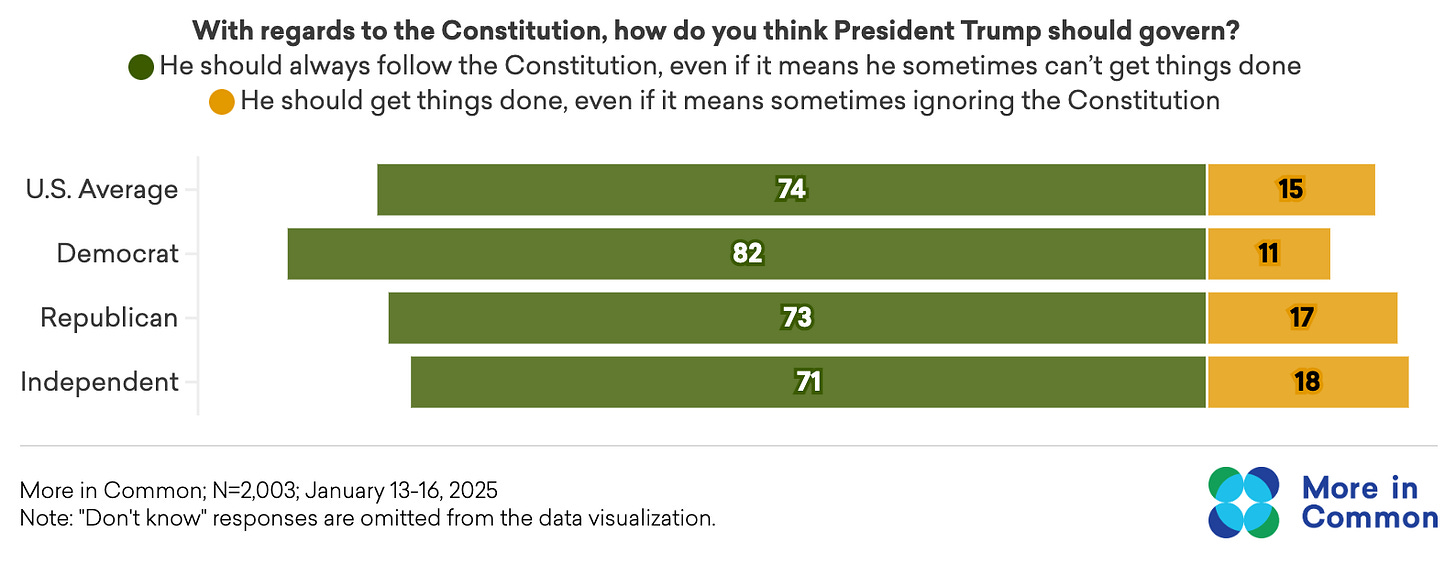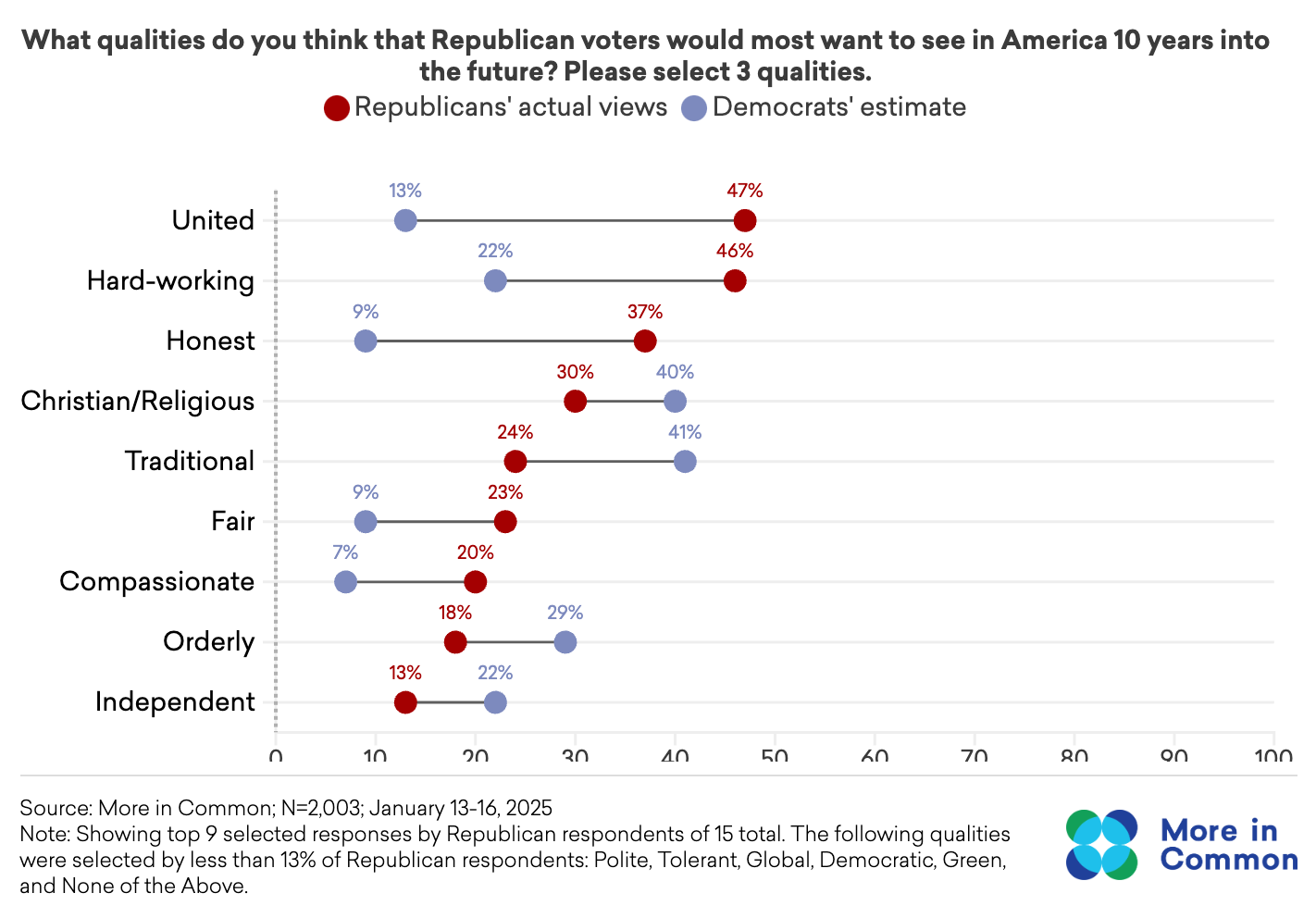Trump’s Return
Americans' Views in A New Political Chapter
Summary: As President Trump begins his second term, More in Common highlights five key takeaways from our latest poll focused on Americans’ views, misperceptions, and aspirations in this new era.
We are at the start of a new political chapter in the United States. President Trump has officially taken office, ushering in what he calls the new “Golden Age of America” — one that he has signaled will differ sharply from the past four years. While much of the national focus over the first few days of the new administration has been on President Trump — his actions, his words, and his vision — it's equally important to know: How are Americans feeling as we enter this new era? What are their hopes for the next decade, and what are their thoughts on how President Trump should govern — from following the Constitution to conducting foreign affairs?
Below are five key insights from our poll of 2,003 Americans taken between January 13-16, 2025 exploring Americans’ attitudes, views, and aspirations as we enter this new political chapter.
1. Republicans want President Trump to bring change to America while honoring constitutional constraints.
When asked whether they want President Trump to either “keep things stable and quiet” or “shake things up and make some noise”, most Republicans (62%) want the latter, compared to 33% of Independents, and just 12% of Democrats. However, noise is not tantamount to being disrespectful of the rule or law. When asked whether they prefer “a leader who is willing to bend the rules or a leader who respects the rules,” 55% of Republicans prefer one who “respects the rules,” while 39% of Republicans prefer a leader who is “willing to bend the rules.”
Crucially, respect for the Constitution remains paramount. A majority of Americans (74%), including 73% of Republicans, believe that he should “always follow the Constitution, even if means he sometimes can’t get things done.” Just 15% (and 17% of Republicans) believe that Trump “should get things done, even it means sometimes ignoring the Constitution.” Gen Z men stand apart from the average, with 42% saying Trump is justified in sometimes ignoring the Constitution.
2. Americans are generally aligned on a foreign policy defined by being respected, peaceful, and a reliable ally to democracies.
Clear majorities of Republicans, Democrats, and Independents want to honor our international alliances and protect democracies from being invaded. Only 13% support the US pursuing territorial expansion through invasion and 26% through the purchase of new territories. Republicans stand out in being most committed (84%) to a foreign policy that ensures that the world respects America, compared to Democrats (58%) and Independents (59%).
3. Support for federal aid to California has underappreciated bipartisan support.
A strong majority of Americans (78%) support federal assistance to California “to help repair the damage and assist victims of the fires”, while just 6% of Americans are opposed. This includes support from 90% of Democrats and 72% of Republicans.
Yet, Republican support for federal aid is grossly underestimated by Democrats. Democrats estimate only 40% of Republicans believe the federal government should provide aid.
4. Division defines the moment while a desire to be united transcends parties.
Across political lines, “divided” is the most commonly chosen word to describe America today.
But when asked to imagine the ideal society in 10 years, Americans most desire the country to be “united”, but don’t believe it’s a priority for the opposing party. Republicans think Democrats want the country to be “green” and “global,” whereas Democrats think Republicans want the country to be “traditional” and “Christian/religious.”
5. Elon Musk’s entry into politics receives mixed, polarized responses.
On average, the words Americans chose to describe Elon Musk are “smart” (32%), “ambitious” (27%), and “creative” (25%). The liberal segments of our Hidden Tribes use negative words such as “dangerous,” “elitist,” and “selfish.” Politically Disengaged, Moderates, Traditional Conservatives, and Devoted Conservatives are more likely to use positive words—including “genius.”
When asked if Elon Musk’s involvement in politics is good or bad, Americans are generally split—with 28% believing at least somewhat good, 37% believing at least somewhat bad, and 35% saying either an equal mix or not sure. Among Traditional Conservatives and Devoted Conservatives, majorities see his political involvement as positive.
Conclusion
In his recent inaugural address, President Trump shared that he wants his legacy to be “that of a peacemaker and unifier.” While public opinion about him remains divided, his desired legacy reflects the aspirations of many Americans. There is a collective yearning for something better — an end to foreign entanglements, reprieve from our exhausting political rhetoric, and change that brings a sense of unity to a divided country.
The perception gaps evident in our research show that, in this uncertain time of fast-moving policy changes, Americans often overestimate our differences on critical issues — such as providing federal aid for thousands of Americans whose lives have been devastated by wildfires. We risk losing sight of our basic empathy towards our fellow Americans.
As we enter this new chapter, More in Common is launching a series of polls to explore how these new dynamics are shaping Americans' priorities, perceptions, and aspirations. It is our hope to provide clarity and perspective on what and how Americans think about our country, insights that can be lost when we only hear from the loudest and most polarizing voices.
📊 View the full report here.
We can’t do this without you!
MIC regularly conducts research that sheds light on both cross-group misperceptions and common ground. Consider supporting our work by making a donation.







